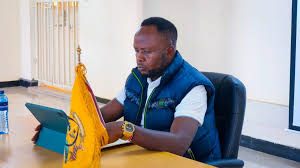Trans Nzoia County Governor George Natembeya in a past appearance. PHOTO|COURTESY
The developments follow attacks on the governor on Saturday, November 22, after armed goons ambushed him at Chwele Ward in Kabuchai, Bungoma County.
The said goons also attacked Kabuchai Member of Parliament Majimbo Kalasinga’s residence. Viral images and video showed Natembeya’s vehicles destroyed, with the county boss alleging that he was shot at several times after the goons stormed the rally.
He would then link the chaos to National Assembly Speaker Moses Wetangula, his political rival.
Speaking while assessing the damage at Kalasinga’s home, Natembeya slammed Wetangula, accusing him of using government machinery to settle political scores.
“This is so primitive, it is not politics. Wabunge wa Kenya, huyu ndio Chairman wenu anafanya mambo kama hii…your leader in the National Assembly is the one doing these things. Sending goons to come and destroy the home of a member of the National Assembly…because they have a different political opinion,” he said. By Collins Shitiabayi, Citizen Digital






